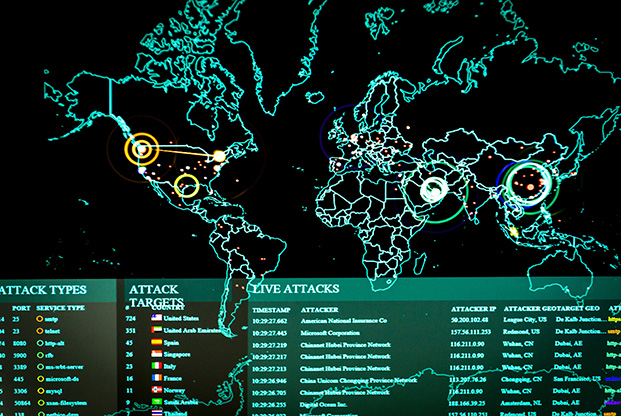
Real-time cyber attacks are displayed on a map at the 275th Cyberspace Operations Squadron, Warfield ANGB, Md. Photo: J. M. Eddins Jr./USAF
American space and cyberspace capabilities are enticing targets to those who wish the US harm.
As the clear world leader in space-based capabilities, which permeate almost every aspect of military and civilian life, the US needs to defend space and prevent its satellites from being these inviting targets.
Highly contested and secretive cyberspace is critical to modern warfare and advanced economies, but has no dominant power. The US is in need of better cyber defenses and forensics.
In this new era of great power competition, Russia and China aren’t looking to take on American strengths, they are looking for vulnerabilities. For thousands of years, “militaries have vied for dominance on land and sea,” Deputy Defense Secretary Patrick M. Shanahan recently noted, and war has now been waged in the air for more than a century.
“Today we are at the dawn of a new era, facing the reality of war’s changing character,” Shanahan said May 4 as US Cyber Command (CYBERCOM) was elevated to a unified combatant command. “Cyberspace and outer space” have emerged as contested domains, “equal in importance with land, sea and air.”
CYBERCOM’s promotion to full unified command status reflects the rapidly increasing importance of the newer combat domains. CYBERCOM previously reported to US Strategic Command (STRATCOM), which itself assumed the duties of the old US Space Command in 2002.
_Read this story in our digital issue:
The reprioritizations may continue. Defense leaders are still debating whether space again needs a dedicated unified command of its own, and if the military should split off a space corps separate from the traditional Air Force.
These new combat domains pose new questions, such as:
- How would the US respond if an enemy decides to attack military satellites on orbit?
- What is the proper response to a cyber attack that shuts down the national electric grid?
- What if an electromagnetic pulse (EMP) attack frys the nation’s electronics but doesn’t directly kill anybody?
Enemies “can counter the advantage the United States has built,” Air Force Gen. John Hyten, STRATCOM commander, said last September at AFA’s Air, Space & Cyber Conference (ASC17).
They can do it “in nukes, space, cyber, electronic warfare … so they’re going down that path, and they haven’t hidden it,” he noted. “At the end of the decade, they’re going to be a long way there.”
The principles of deterrence have not changed: Enemies must know that attacking the US will cost them more than they can stand. They must understand the US has credible responses—and the will to use them.
It is important to think broadly. “If you just think about space and you just think about cyber, you’re not thinking about what is motivating our adversaries to go that way,” Hyten added.
As the dominant player in space, the US clearly has the most to lose from war in orbit. So war that extends into space must be avoided. Part of the deterrence will come by making clear enemies can’t get away with certain types of attacks.
China understands if it were to sink a Navy ship in the international waters of the South China Sea, the US response won’t necessarily be a naval response in that sea. Similarly, Russia knows if it shoots down an Air Force transport in international airspace over the Baltic Sea, the US won’t necessarily respond with airpower over the Baltic.
The same credible ambiguity is needed in space and cyberspace.
The National Security Strategy released at the end of 2017 sends a powerful message that is only now getting the attention it deserves.
Many countries believe “the ability to attack space assets offers an asymmetric advantage and as a result, are pursuing a range of anti-satellite (ASAT) weapons,” the strategy reads. But then comes the kicker: “Any harmful interference with or an attack upon critical components of our space architecture that directly affects this vital US interest will be met with a deliberate response at a time, place, and domain of our choosing.”
This is exactly the right message: credible ambiguity.
Enemies also hide behind opacity. Russia, China, and other adversaries try to exploit indecisiveness by denying the actions they take (such as the initial invasion of Ukraine) or doing things that fall just short of what might force a nation to respond (such as building artificial islands in international waters).
Cyber warfare is notoriously difficult to trace. Malicious actors “use cyberattacks for extortion, information warfare, disinformation, and more [with] a troubling degree of deniability,” the National Security Strategy observes. “When faced with the opportunity to take action against malicious actors in cyberspace, the United States will be risk-informed, but not risk-averse” in considering its options.
These options should not be limited to cyberspace. A powerful deterrent will make sure enemies understand an attack in space or cyberspace could bring a response beyond space or cyberspace. This should now be coming into focus.